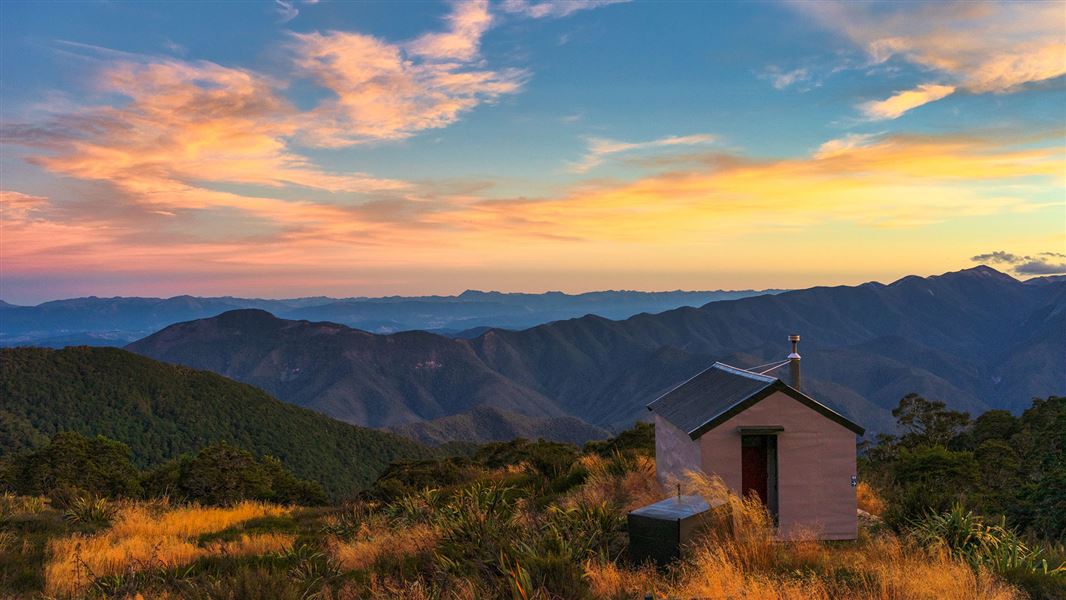Care for New Zealand, for now and for future generations, by following these simple steps each time you stay at a DOC hut.
Before you go
Find a hut
DOC manages a network of over 950 huts throughout New Zealand. Some of these huts can be booked in advance to help you plan your holiday.
Pay your fees
Pay your fees to help keep huts available in the future.
Pay fees online for bookable huts, or use hut tickets or a backcountry hut pass for non-bookable huts.
Bringing your dog
Huts have the same dog access rules as the area they're in. Some areas allow dogs, others require a permit, and some do not allow dogs at all. Before you go, check the dog access.
Dogs on conservation land: Rules and regulations
Dogs are not allowed inside huts. You are responsible for sheltering and securing your dog outside the hut.
If you're unsure about dog access in a particular area, check with the nearest DOC office or visitor centre before you set out.
Where dogs are allowed, it's important to keep your dog under control at all times. Even the most obedient dog has the potential to kill wildlife and most huts are located in or near protected areas.
At the hut
Be tidy and considerate
Huts are shared spaces and should be kept hut clean and tidy. A broom, brush and pan are provided — use them, and leave muddy boots outside.
Share huts with others by being considerate, make room for late comers and keep quiet if others are sleeping. Share boiled water with others to help conserve gas.
Heating and cooking
Conserve gas when using gas heaters and cookers. While cooking, always open a window or door to allow dangerous carbon monoxide fumes to escape.
Keep an eye on boiling water/food, and be sure to turn gas heaters off overnight. Make sure the gas is properly off when you leave.
Take care using wood burners, keep the fire contained and never leave it unattended. Only burn dead dry wood and be careful with hot ashes.
Make sure the fire is extinguished before leaving. Use wood sparingly and replace any you use for the next visitors.
Toilets
Always use toilets provided. There are toilets at all DOC huts.
No smoking or vaping inside huts
No smoking or vaping in huts. Take your cigarette butts out with the rest of your rubbish.
Hunters
Hunters must follow the Firearms and Safety Code.
Protect nature
Protect native plants and animals, and leave the land undisturbed.
Some DOC huts are in areas where native species are vulnerable to disease and pests.
Help prevent these from spreading by following simple precautions, including cleaning gear before and after entering these areas. Look for notices at the huts and DOC Visitor Centres for more details.
No unauthorised drones
A permit is required from DOC to use drones on public conservation land or near marine mammals.
When you leave
Before leaving, tidy the hut and close doors and windows securely.
Dispose of waste responsibly
Carry it in, carry it out. There are no bins at DOC huts so take all your rubbish, recycling and food scraps out with you.
Take two bags, one for recycling and the other for rubbish/food scraps. Dispose of your waste responsibly.
Clean your gear
Always thoroughly clean your equipment before and after trips to minimise spreading weeds and diseases.
Hut users code
- Keep huts clean and tidy. A broom, brush and pan are provided—use them, and leave muddy boots outside.
- Conserve gas when using gas heaters and cookers. During cooking always open a window or door to allow dangerous carbon monoxide fumes to escape. Keep an eye on boiling water/food, and be sure to turn gas heaters off overnight and make sure it is properly off when you leave.
- Take care using wood burners, keep the fire contained and never leave it unattended. Only burn dead dry wood and be careful with hot ashes. Make sure the fire is extinguished before leaving. Use wood sparingly and replace any you use for the next visitors.
- Share huts with others by being considerate, make room for late comers and keep quiet if others are sleeping. Share boiled water with other trampers to help conserve gas.
- Carry it in, carry it out – recycle ALL your rubbish. Take two bags, one for recycling and the other for rubbish/food scraps to carry out with you and dispose of responsibly.
- No smoking or vaping in huts. Take your cigarette butts out with the rest of your rubbish.
- Hunters must follow the Firearms and Safety Code.
- No dogs allowed inside huts.
- Before leaving, close doors and windows securely.
- Always pay hut fees.
